Review By Jennifer Mustoe, Front Review Reviewers
Center Street Theatre brings The Crucible to Provo, a play that is rarely performed in Utah. Relevant and pertinent, The Crucible written in 1953, is an allegory to the mania and lies that took place during The McCarthyism Era. The Salem witch hunts/trials are the story in this play, but the themes of hysteria, blame, and deception by a small group of powerful people who ruin the lives of their neighbors may feel uncomfortable. Nevertheless, The Crucible‘s significance makes it a required and enlightening experience.
John Proctor, powerfully played by Seth Johnson, is at the center of this darkly exciting tale. It is revealed early on that he has had an affair with Abigail Williams (McKenzie Blair), a coy and manipulative servant, who not only wants to continue the affair, but exudes triumph over John’s sweet, reserved wife Elizabeth (Hannah McKinnon). The dynamic between these three is palpable, interesting, and frankly angering. McKinnon, perfectly cast, at once shows her devastation about her husband’s dalliance and her understandable hatred toward the conniving Abigail’s triumph..Blair is all that a detestable flirt can be, and earns the audience’s contempt. These three actors’ work clearly hits its mark. Abigail has her following of young women: Betty Parris (Elise Jones), Mary Warren (Addie Bennet), Mercy Lewis (Josie Brown), Susanna Wolcott (Haylie Davis), and Barbadian slave Tituba (Audrey Dadson). These make up Abigail’s clique and all are found dancing naked in the woods by Betty’s uncle, a clearly appalled Reverend Parris (Jaxton Romeo Brenner). Brenner shows his panicked alarm all the while he’s onstage. I wanted to jump onstage and reassure him, “It’ll be okay.” Though, of course, it isn’t. Far from it.

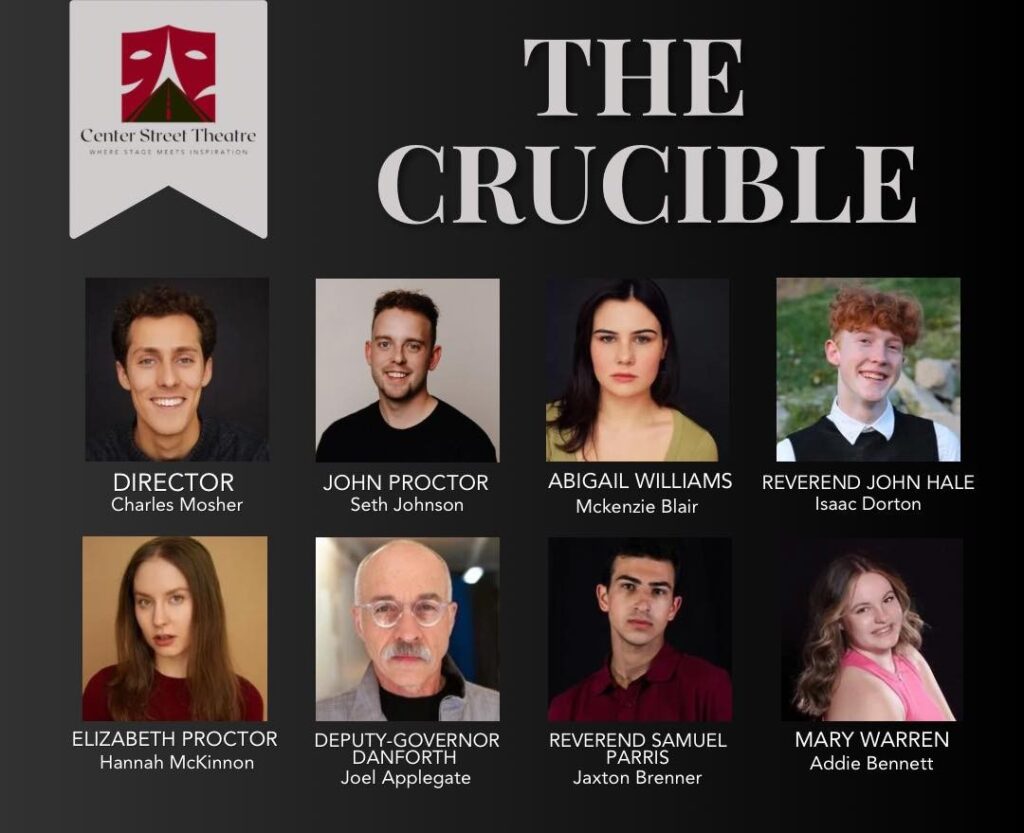
There is talk that these young women are practicing witchcraft and have been drinking blood. From the beginning, this group of young women, called “children” by the adults, frankly galled me. Have I interacted (been left out and embarrassed) by a powerful group of others in my life? I have. Perhaps that’s why this band of teenagers were so loathsome to me.
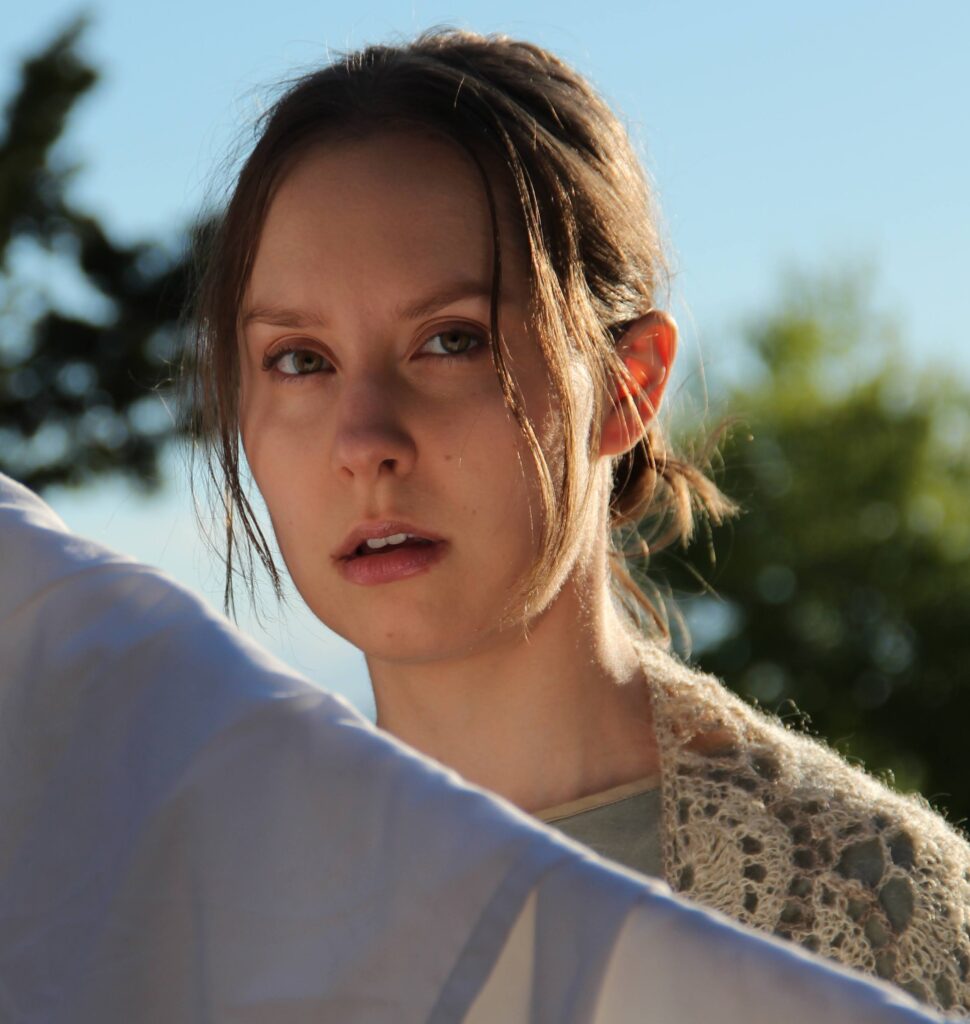
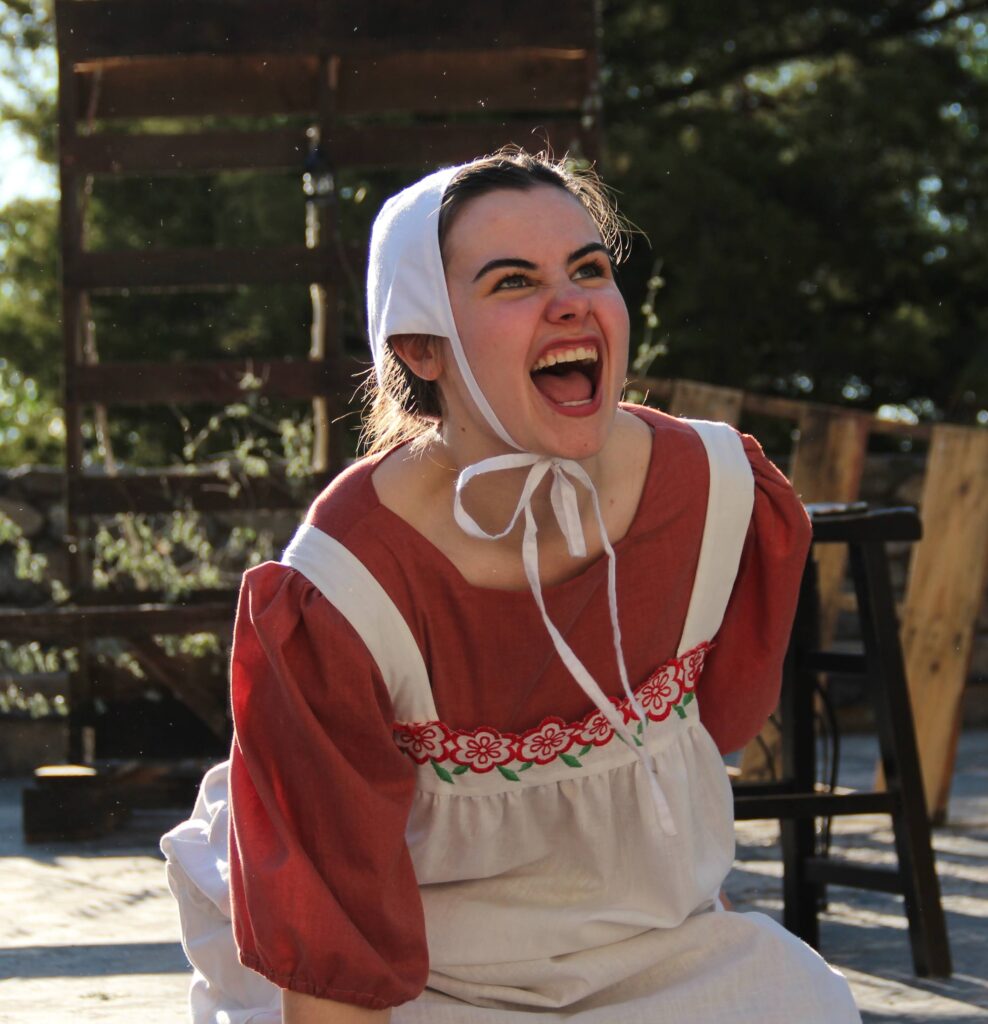
The haves and have-nots are established: Proctor, the belligerent Giles Corey (Tom Mosher), and rich Thomas Putnam (KC Johnson) begin to argue about land. This dynamic is reminiscent of McCarthy’s accusations of those with less power and means. (And perhaps displays current actions.) While Proctor leaves, Reverend Hale (Isaac Dorton) enters the fray and both Church officials examine Betty, who awakens and shrieks and thrashes from side to side. Jones is starkly believable as the frightened girl. Parris and Hale question Tituba, who admits the naked young women have seen the devil, tells them other townspeople are also doing evil things–the whole town is horrified and suspicious of each other. Dorton commands every scene he is in. His mannerisms and slightly mocking smile flesh out this character in an unusual and persuasive characterization,which gives a hint of his change of heart later in the play.
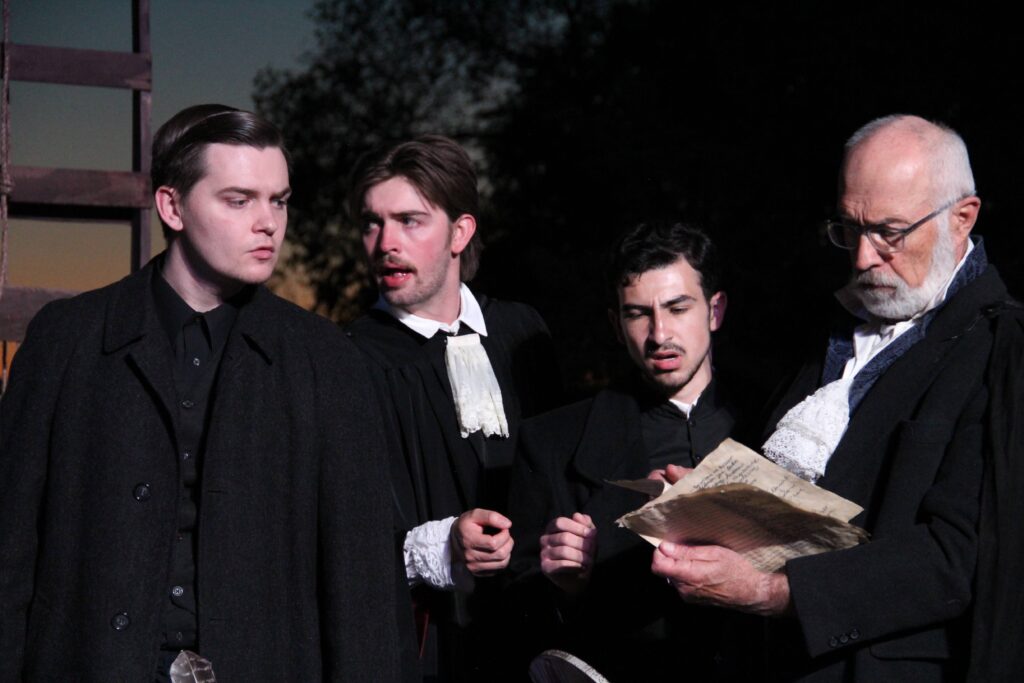
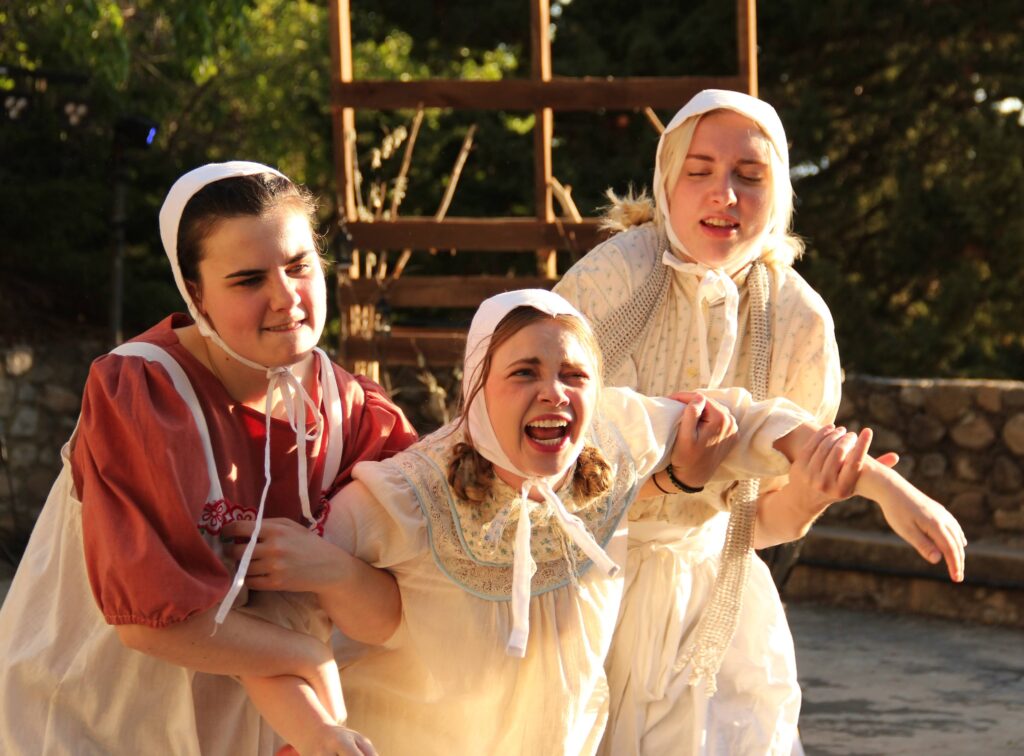
The tension between Elizabeth and John escalates as she asks her husband to admit to the affair and he refuses. His confusion is clear: does he appeal to his wife’s understandable and heartbroken pleas, or perhaps be accused of witchcraft? It’s a tough choice. Johnson’s shame, anger at himself and Abigail, and clear love for his wife are painful to watch. I felt more empathy for him than any judgment about the affair, as he clearly has tried to repent and sees clearly the necessity to protect Elizabeth. The town is going crazy with the idea that the devil is amongst them. Who is evil and who is good? Several of the wives are arrested, and the play shows the crazed fall into internal destruction in the town.
The deception when cohesive, viable villagers suspect each other and hope they aren’t the next “criminals” to be arrested and punished is agonizing. It was interesting to me that women were part of those accused and taken into custody. This is a time when women, while not “equal” to men and somewhat revered for their value as caretakers of husband and children become those arrested. It is also revealed that all can be disbelieved and mistreated and it made me think of these same situations happening in the United States now–heartbreaking, unfair, illegal, and horrifying. “Witch hunts” don’t happen just in Salem, MA in the late 1600’s.
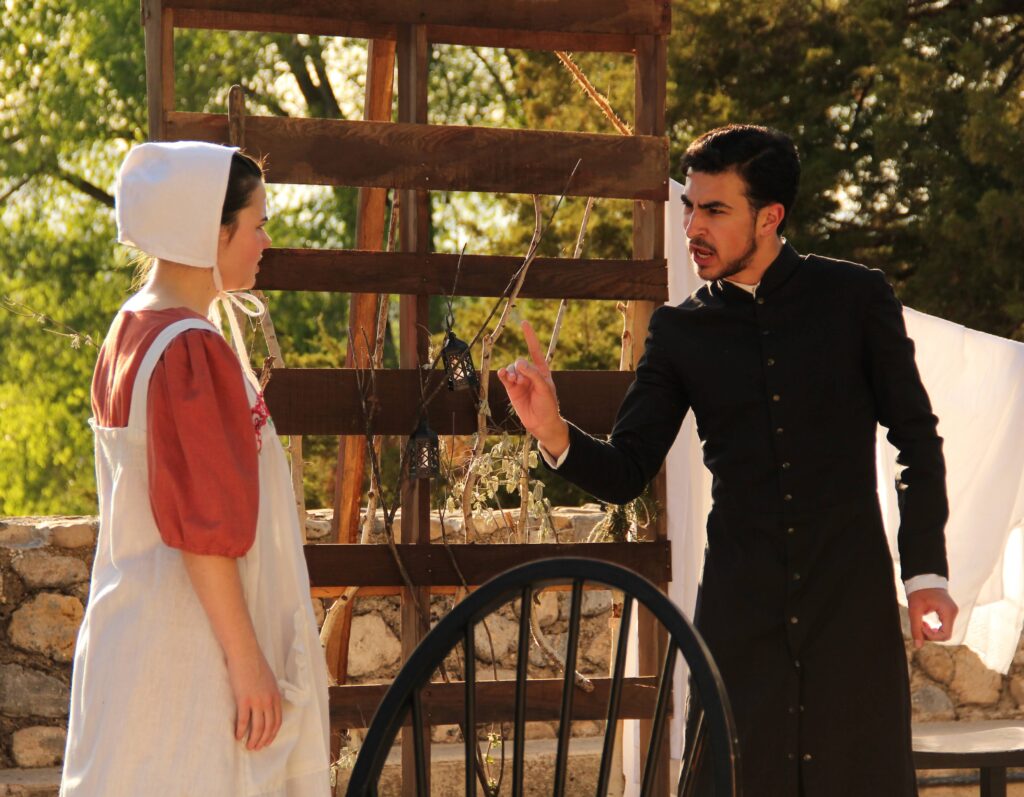
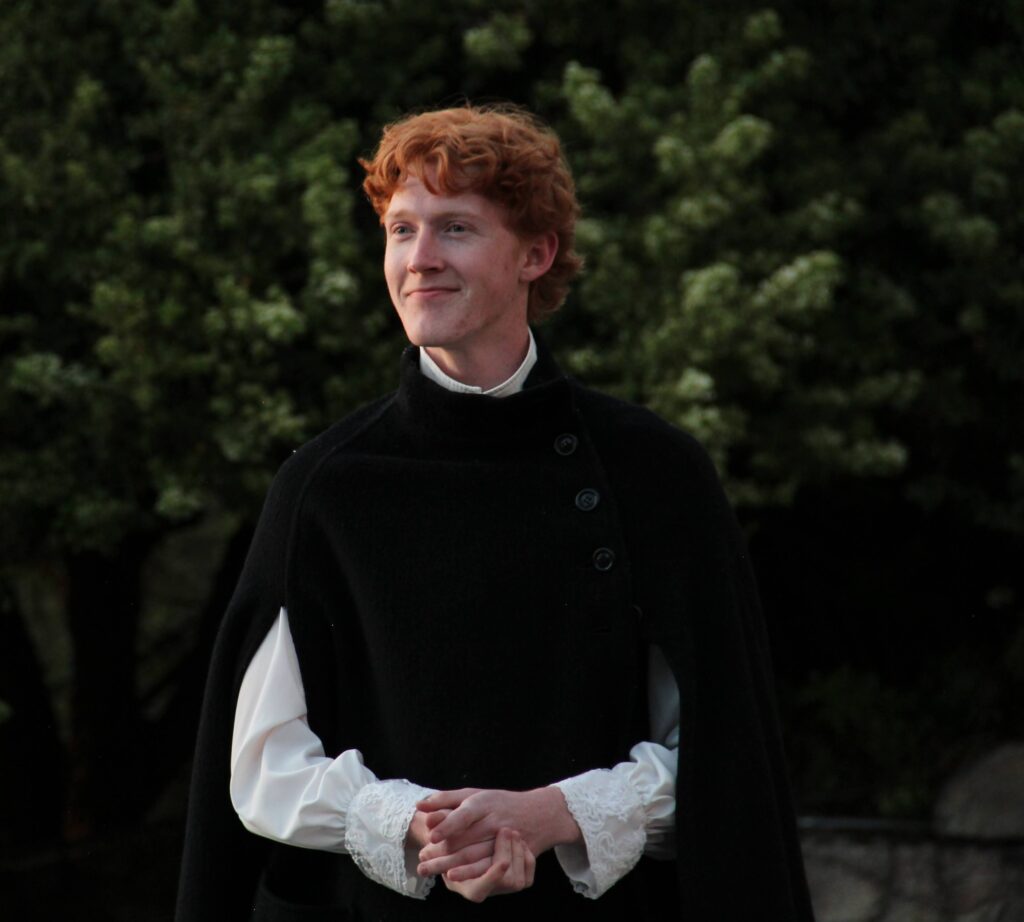
Joel Applegate enters as the pompous Judge Danforth, adorned in the finest costume (costumes by Lydia Davis), which sets him apart from Salem’s citizens. Applegate sneers through every line, earning our delicious distaste in a wonderful and disgusting manner. He lords over all and ends up making horrific decisions that damage all in the town. But he has to, doesn’t he? You can answer this for yourself.
You see, this is a story that takes place in a different time with different standards. Danforth is supposed to protect the innocent with his righteous force, and his education and station makes this required. Ah, the real devils aren’t amorphous witches and evil. It is in the hearts of those with legal and religious authority, and those who are manipulated by beguiling fear. Those in power demand that Proctor and many others confess and they will be freed. Johnson’ final pleas are heartbreaking, and as he insists that saying his confession is enough but won’t agree to have his signed confession posted shows his true, valiant character. The final scene is a miasma of sadness, unfairness, and true courage.

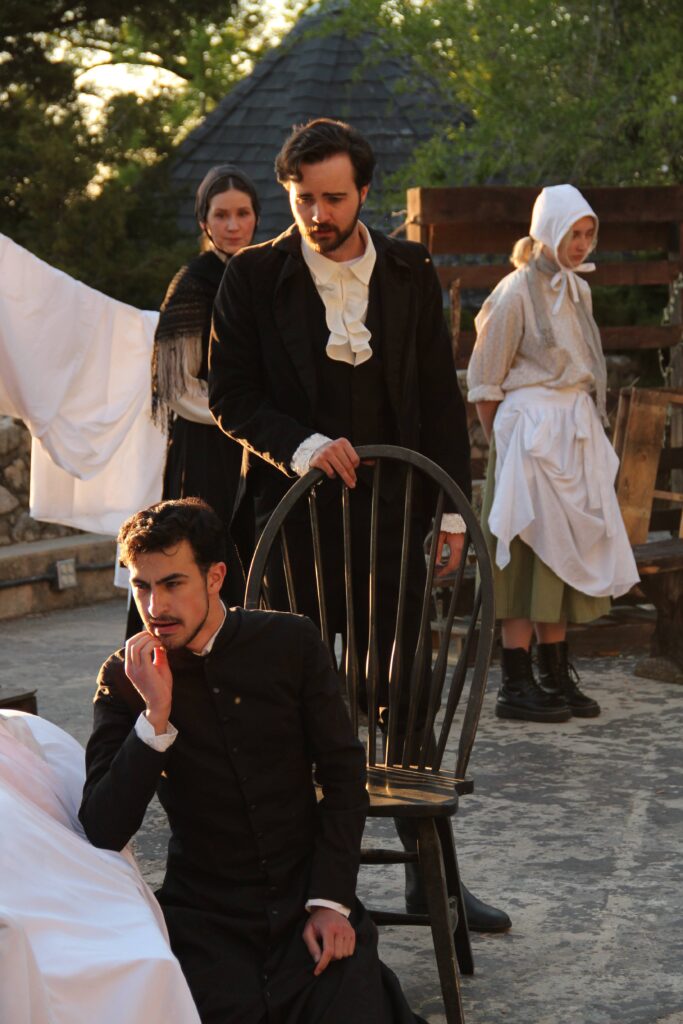
The set (Opal Tolman) at the Castle Amphitheatre is spare but effective. Lighting by David McKain sets the unearthly mood, and the spooky wailing music (Devon Parikh) create an unsettling atmosphere.
Director Charles Mosher uses a deft hand with this story and his talented cast. He has provided just a touch of humor, just a slight touch, with the deep, troubling, frightening atmosphere in this stark and relevant play. He has allowed his actors the opportunity to flesh out the roles as they see them and not necessarily as the more expected characters, and it works.
The Crucible the audience was large and very enthusiastic. I recommend this production heartily. Prepare to be engaged, sympathetic, and entertained. You will find yourself thinking not only of the story you’ve seen and experienced, but the themes and truth it displays.
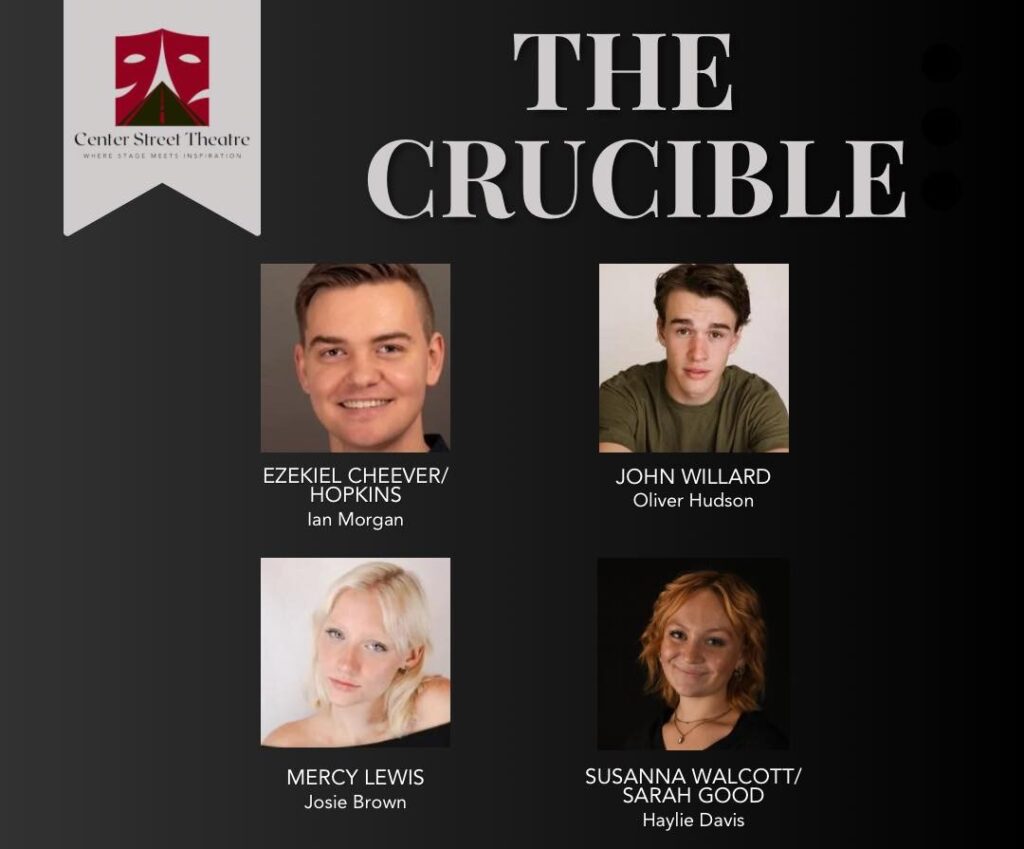
The Center Street Theatre presents The Crucible by Arthur Miller.
The Castle Amphitheatre,1300 E Center Street, Provo, UT 84606
May 10, 14-17, 2025 7:00 PM
Students: $15, General: $22.13
Note: The Castle Amphitheatre is made of stone and can be uncomfortable to sit on. We advise you to bring blankets and pillows or other seating options so you’ll be comfortable. There are cushions for rent, while supplies last, and proceeds go to the actors.
Concessions and restrooms are up the metal stairway and to the right.
Parking is down the hill as parking by the Amphitheater is on a hill. Feel free to drop off attendees at the entrance to the venue and then park down the hill, where there is ample parking.
May 9th–17th, 2025
Castle Amphitheater, Provo, UT

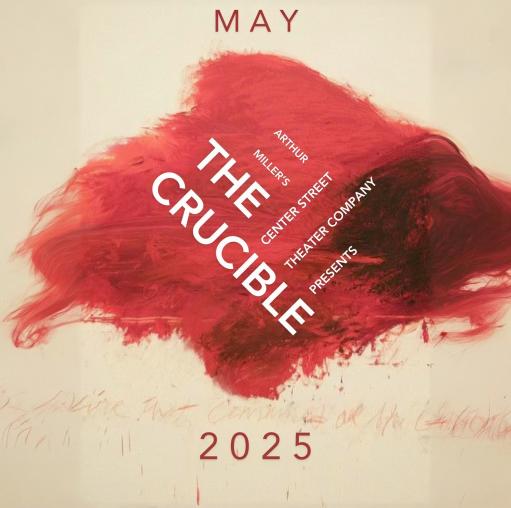
0 Comments